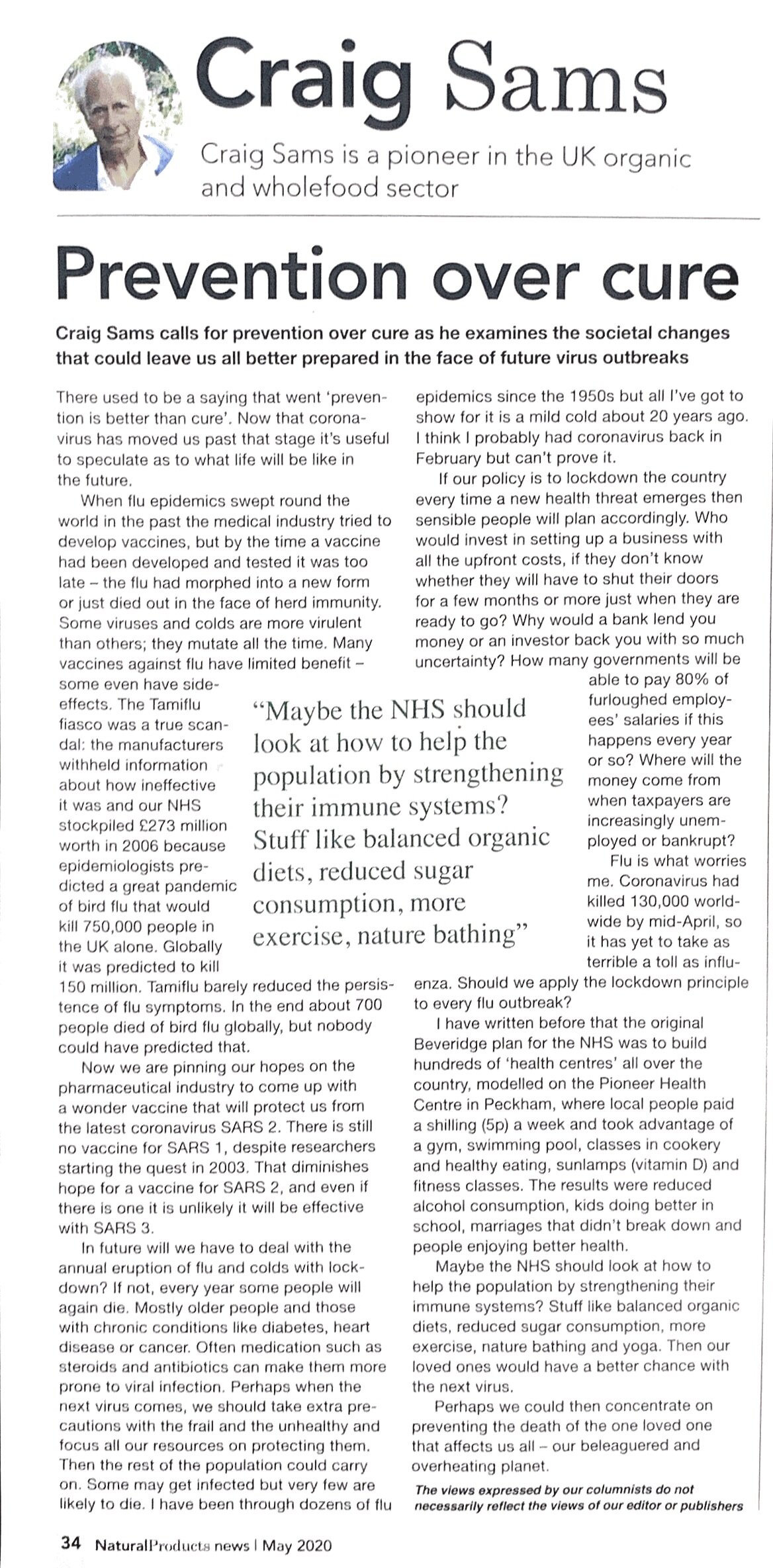Some people will allege that Covid 19 is the result of ‘gain of function’ research at China’s germ warfare laboratory in Wuhan and point to the involvement of America’s EcoHealth Alliance in financing research there after Obama’s government put a stop to it in the US. Others will point to plucky little bats - living in caves 800 miles from Wuhan.
What is sure, though, is that people worldwide now really get it about the immune system. Sales of organic food and vitamins and supplements that strengthen immunity are booming. Awareness of the fact that most people who are symptomatic or die of Covid have ‘comorbidities’ has sparked a wider understanding of how to stay healthy and shrug off this horrible mutation of the coronavirus, a virus we’ve known for centuries as the ‘common cold.’ People have always been getting colds, some get them worse than others and some rarely get colds at all. Now many more people understand why.
The comorbidities that land you in hospital with Covid include obesity, diabetes, heart disease, kidney disease and cancer. If you don’t have one of those then the likelihood of Covid exposure giving you any symptoms is pretty low. You are certainly very unlikely to die of it.
What causes comorbidities? The main factors are diet, exercise and environmental pollutants. (plus booze and fags)
Sugar and refined cereals drive obesity and diabetes. Now more people are reducing sugar and eating whole grains.
Hydrogenated fat and overeating cause heart disease. Cardiovascular disease has dropped 60% in Denmark since 2002, when they led the world in banning hydrogenated fat, or trans fats, in food. Denmark ranks 45 on the global list of Covid deaths per capita. The USA and India were the last to ban hydrogenated fat, the US last year and India planning cuts next year.
A diversity of gut flora microorganisms helps resist the virus. Overuse of antibiotics devastates the gut flora. The NHS is now urging doctors to stop prescribing antibiotics for colds and flu. The mystery is why doctors ever did - they’re doctors, not pharmacists.
In 1948 the NHS envisioned centres all over the country educating people about healthy diet, exercise and preventive medicine. The British Medical Association insisted that the first point of contact was with a General Practitioner, not some poncy ‘health centre.’ This was a victory for doctors and the pharmaceutical industry. The ‘prevention versus cure’ debate has been going on ever since.
In the 1950s every Briton could get free cod liver oil and free concentrated orange juice. This was because 70 years ago doctors still understood that if people had a high level of Vitamin D and Vitamin C they would be able to better resist colds and flu. This was probably the last official support of prevention as an alternative to medication. Since the coronavirus pandemic numerous doctors and clinicians have started urging that getting people’s D and C levels up is a key preventive measure. In January 2021 the NHS finally announced that free Vitamin D was available and urged people to get their D levels up, This was 11 months after the pandemic hit and after the Government had wasted tens of billions on track and trace and lockdowns. In 2020 in the sunniest April and May in memory people were told not to go out in the Vitamin D-rich sunshine.
The authorities are talking about ‘health passports’ to allow people who have been vaccinated to travel and go to the theatre. How about health passports for people who have a robust immune system and are unlikely to get colds or flu? It could be easy to do: just measure indicators of immune strength such as T Cells and Vitamin C, D and zinc levels. Doctors and nurses should have that kind of health passport before they go to work in hospitals, to protect them and patients. If your immunity is good, skip the vaccination. If not, get the jab.
And maybe it’s time to stop all germ warfare research everywhere? Just in case something could possibly go wrong?
Could we also please have ‘eco’ and ‘bio’ back? The EcoHealth Alliance researches deadly viruses. ‘Biowarfare’ puts them to work. Not our thing at all.












